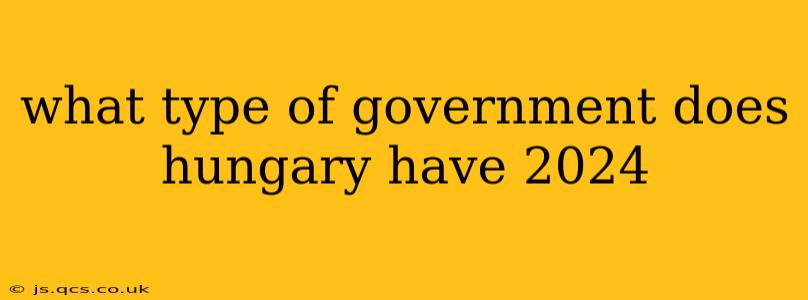Hungary operates under a parliamentary republic system. However, understanding Hungary's governmental structure requires looking beyond this simple classification. The country's political landscape is characterized by a dominant ruling party, Fidesz, which has consolidated significant power, leading to concerns about democratic backsliding among international observers.
While the constitution establishes a framework for checks and balances, the reality is more nuanced. Let's delve deeper into the specifics:
Key Features of Hungary's Government:
-
Parliamentary System: The country's head of state is the President, elected by Parliament. The Prime Minister, the head of government, is appointed by the President and is usually the leader of the party with a majority in Parliament. The National Assembly (Országgyűlés), a unicameral legislature, holds legislative power.
-
Dominant Ruling Party: Fidesz, led by Viktor Orbán, has held a supermajority in Parliament for several consecutive terms. This has enabled them to enact significant legislative changes with minimal opposition, impacting the balance of power within the system.
-
Checks and Balances (in Theory): The constitution outlines a system of checks and balances, with the judiciary, executive, and legislative branches possessing distinct powers. However, critics argue that these checks are significantly weakened in practice.
-
Concerns about Democratic Erosion: Several international organizations, including Freedom House and the European Union, have expressed concerns about the erosion of democratic norms and institutions in Hungary. These concerns often center on issues such as media freedom, judicial independence, and the rule of law.
What are the main powers of the Hungarian government?
The Hungarian government, led by the Prime Minister, exercises extensive executive power. This includes:
- Formulating and implementing national policies: This involves setting the national budget, overseeing economic development, and implementing social programs.
- Appointing key officials: The government appoints judges, senior civil servants, and other high-ranking officials.
- Enforcing laws: The government is responsible for the execution and enforcement of laws passed by the National Assembly.
- Managing international relations: The government represents Hungary in international forums and negotiates treaties with other countries.
Is Hungary a democracy?
This is a complex question. While Hungary holds elections and has a constitution that outlines democratic principles, many observers argue that the country's democratic institutions have been significantly weakened. The concentration of power within Fidesz, coupled with concerns about media independence and judicial integrity, raises significant questions about the extent to which Hungary currently functions as a robust democracy. The debate continues among political scientists and international organizations.
What are the main criticisms of Hungary's government?
Criticisms of Hungary's government frequently focus on:
- Media Control: Allegations of government influence over media outlets have led to concerns about freedom of the press and the suppression of dissenting voices.
- Judicial Independence: Concerns have been raised about the government's influence over the judiciary, impacting the impartiality and independence of the court system.
- Rule of Law: There are concerns that the government's actions have weakened the rule of law, potentially impacting the protection of individual rights and freedoms.
- Use of EU Funds: Scrutiny has been placed on Hungary's use of European Union funds, with allegations of misuse and lack of transparency.
What is the role of the President in Hungary's government?
Hungary's President plays a largely ceremonial role. While the President formally appoints the Prime Minister and other government officials, these appointments typically follow the results of parliamentary elections. The President’s real power is limited, compared to the Prime Minister and Parliament.
In conclusion, while Hungary's formal governmental structure is that of a parliamentary republic, the concentration of power within Fidesz and concerns about democratic backsliding significantly shape the reality of its political system. Understanding this context is crucial to comprehending the nature of governance in Hungary in 2024.
